Math Readiness: GCSE Exam Prep for Homeschool Teens
For all teens, maths is seen as one of the core subjects. Math skills are essential for all science courses, as well as engineering and computer science. Math readiness at each level is key to providing a successful learning experience for your home-educated teen preparing for the GCSE Exam or USA Qualifications.
If your child is doing any science, and even subjects like iGCSE Geography, there will be maths. Therefore, to have success in STEM fields, there needs to be success in maths. Mathematics is the language of science, therefore a firm grasp of maths with allow science concepts to also open up. A maths qualification is required for almost every job, college course or university entrance: regardless of the subject area. For students who have a particular gift in maths, it is worth bearing in mind that maths graduates have a wide range of career paths open to them, and not only in “math jobs”. In a STEM-driven modern world, there is an increasing importance of mathematics and the skills maths education fosters.
ying the Foundation for iGCSE Maths
What are the key skills required for starting iGCSE Maths? Knowing that your teen is ready for the step up to iGCSE maths can be challenging, and knowing how best to prepare a younger teen to be ready when the time is right can be challenging.
As a home educator, I have found it difficult to find a good curriculum for my younger teens. There are many good maths curricula for primary-aged children. But the UK’s early high school curriculum is harder to find. Therefore, we have worked hard to create a maths curriculum to prepare students for iGCSE maths.
Gateway Math Qualifications
In the UK, GCSE/iGCSE/Nat 5 are the gateway math qualifications to open those doors. So even if your child is not heading into a mathematics field, they will still need to do a math course to some level. While there may be alternative ways to ain’t he qualifications, such as the US high school transcript and diploma, all students need a specific math level achievement as proof of their math learning.
In this post, I will refer to GCSE maths, however, the principles discussed are applicable to iGCSE, Nat 5, and any students taking an American high school math route. However, maths is also a subject that many students struggle with. As home educators, how do we help our high school students meet their potential in maths and feel confident in their maths skills?

A Solid Foundation
In those GCSE years, what Americans call early high school (9th and 10th grade), a strong foundation is vital for GCSE maths. In teaching maths to upper high school level, I repeatedly encounter many of the problems that students have around “simple maths”. By that, I mean, teens can be working on complex algebra or calculus problems; they understand the difficulty of maths, but struggle with manipulating fractions of indices. When teaching those pre-iGCSE teens (in their middle school years), and below, work on those number skills. Ensure a firm grasp of fractions and how to manipulate them both in calculations, as well as with equivalent fractions.
Recommended products
-
KS3 Maths Year 1
£360.00 -
KS3 Maths Year 2
£360.00 -
iGCSE Maths: Year 1
£360.00 -
iGCSE Maths: Year 2
£360.00
Maths Revision Bundle | iGCSE Maths 1 Week Intensive
Math Revision 1 Week Intensive for Edexcel iGCSE Maths.
Maths Revision Details:
- When: Monday 21 April – Thursday 24 April 11 am-12:30 pm GMT
- Duration: Four 1.5-hour sessions
- Tutor: Emma Cummings
Edexcel iGCSE Maths Revision Intensive Sessions Will Cover:
- maths concepts the students find difficult,
- exam technique and test-taking strategies
- understanding exam questions and mark schemes.
- Past papers review and discussion
- and more.
See the detailed course description for the complete intensive session daily plans.
Out of stock
Similarly, understanding the way basic operations work, such as BIDMAS or PEDMAS, will help students understand how these foundational ideas at higher levels become keys to success. Basic number sense skills built from a young age allow children to grow in confidence in maths, and these skills flourish as children become teens. Number recognition and number sense will allow your child to better grasp ideas of primes, multiples, and factors. These skills are then further built on throughout the GCSE and onto A-level maths.
It is something to be aware of: if a child struggles with basic number sense, it is often an indication of dyscalculia. Identify the areas your child struggles with early on, then these areas can be strengthened over time.
Recommended Resources
-
Math Facts Chart Printable + Cheat Sheets
£7.60 -
Maths Tutoring: 4-Session Bundle
£100.00 -
Maths Revision Bundle | iGCSE Maths 1 Week Intensive
Original price was: £140.00.£25.00Current price is: £25.00.
Math Readiness: GCSE Basic Math Skills
Like the strong foundation, build the basic math skills well. At the GCSE level, this means focusing on gaining a strong understanding of how to solve a simple equation or factorize a simple function, before moving on to something more challenging, like completing the square. A strong understanding of basic algebra will stand the student in good stead! Have teens understand simple mathematical concepts in geometry before mastering analytic geometry and the various circle theorems, or a difficult problem in trigonometry. Again, a big problem for students advancing to A-level, Higher Maths, or other advanced math classes is a poor understanding of these basic maths skills at GCSE level.
-
iGCSE Maths: Year 1
£360.00 -
iGCSE Maths: Year 2
£360.00
Learning Maths Well
Whether you choose to self-study GCSE maths or to take a math class online, these are principles of great math instruction:
Link maths to the real world.
Many teens fail to see the relevance of maths in the real world. The dreaded term, “When will I ever use the Pythagorean Theorem in real life?” or any other maths concept, is so damaging to maths education. Maths is literally everywhere in our daily lives. The fact you are reading this on a screen, sent from a computer somewhere in the world, is all down to maths: from the internet connection, to the computer programming, to the technology which makes the hardware possible. Every day life is run by maths!
Link math concepts together.
A strong conceptual understanding helps those moments of understanding, as it links ideas. Maths mastery is like building a house. Hands-on activities help new concepts build on basic concepts. To be able to solve an expression with algebraic fractions and irrational denominators takes skills in: manipulating fractions, factors, multiples, surds, and, of course, algebra. They are all linked, and finding everyday activities for their use helps build understanding and mastery in a fun way.
Make maths visual.
Encourage teens to draw diagrams and make the numbers make sense. This is obvious for a geometry problem, but consider word problems. A diagram to present the information allows you to explore the question and hopefully make sense of the information given. Making maths visual is also very helpful with algebra. Taking an equation and using graphing software can allow teens to see what it looks like and how it behaves. Make the connection between the shape of the graph and what the factorized expression looks like. Having that visual understanding in algebra helps when students come to advanced algebra, which seems even more abstract.
Maths at this level is essentially about logic and critical thinking.
Look for opportunities to grow these skills. Either through maths games or logic games. The Nrich website by Cambridge University has many mathematical thinking activities for free, which teens can use to improve these skills of critical thinking.
Study Skills for GCSE Math Readiness
The study of math is a hard subject. Few people just “get it”; most people, including those who do well in maths, work hard at it. But there is good news! Key parts of the battle when it comes to studying are planning, motivation, and confidence. Planning how to study and when helps provide a framework. Setting a goal to study for so long helps teens focus their attention. If a teen struggles with motivation, try offering awards for time spent and goals reached. For example, if you do 30 minutes of study, you can do 15 mins of _________ (insert a favourite activity). Motivation can often be linked to confidence. If maths is a struggle, then they may lack motivation because maths makes them feel stupid. Planning and breaking things down into smaller chunks can help with that. Making it possible to have small wins built on over time helps build confidence.
There are different ways to help with math readiness for GCSE exam success, and they are easily implemented into your home education:
Frequent reviews.
Typically, GCSE/iGCSE maths is a 2-year subject. Revisit the material you have covered; doing so can be a key factor in retaining the knowledge learned. Even if this is a couple of times a week, doing 2/3 questions on topics you have already covered. For example, you might be in the midst of probability, but do a couple of factorisation math problems that week too. By doing a little and often then it keeps things from being easily forgotten. Doing a mini weekly review is a good time to do this.
Have your teen create their own maths problem.
If you have done the equation of a straight line, for example, have them write their own problem and supply a solution. This is a variation of the idea that teaching a subject is the best way to know a subject.
Have them take notes.
Make the notes highly visual, and do mind maps of a subject area. A good way to take maths notes is to have students copy a detailed solution to a problem. In copying a solution, include a step-by-step process of how to arrive at the solution. Review these notes frequently.
Do word problems.
Practising real-world problems gives teens practise at applying a concept in a real-life scenario. They have to think about what is being asked of them and what skills are needed. Questions in which more information is given than is needed are good. Students who are unsure can be anxious to use all the information, so encountering questions where they need to decide what is important grows confidence in this area.
Lots of past papers!
There are many review packets of past papers online. Doing lots and lots of past papers is the best way to prepare for exams. In the early days of exam prep., allow your teen to have their notes and books. The more papers they do, they come to realise that the same kind of questions are asked every year. When doing past papers, take a note of what questions are particularly challenging.
Work on problem areas.
The work done with past papers will highlight the problem areas. Make a plan to deal with these. In addition to the other maths work, set aside 10 mins a day to concentrate on one skill. Create a goal for improvement on this skill, and set an alarm for when this skill will be studied, and a timer for 10 mins. By doing this, you create a manageable task, which breaks something difficult up.
Create flashcards or a Quizlet.
There are certain things that need to be memorized. For example, trigonometric functions, angle formulae, polygon names, the rules of probability, Venn diagram notation, etc. Create either handwritten flashcards or use Quizlet to make digital flashcards.
Revising Mathematics Programs.
Look for a focused maths revision program for home educators. These can be helpful for that last-minute push.
The Best Books for GCSE Math Readiness Exam Prep.
There are a number of excellent resources that can help with preparation for a maths exam.
- The CGP revision books are an excellent resource. They take the core points of the curriculum and condense them down.
- The CGP 10-minute test books are also useful. These are helpful to use throughout the year to revisit concepts. Or if a student is struggling with a certain type of problem to do a quick revisit. This helps with breaking up revision into smaller pieces.
- GCSE Maths for Neurodivergent Learners. For neurodivergent teens, maths can be a major challenge. This is not a book to give to the neurodivergent learner, but it is a resource for parents and educators to use to help teens with learning differences grasp the concepts of maths. Again, it is probably worth using the ideas throughout the academic year.
Making math fun can be tricky, but there are many resources from within the field of math to help home educating families prove their math readiness for college-level math. Software like Maths Pad is a highly recommended resource that is affordable and can help gain the skills required in iGCSE maths.
Maths Revision Bundle | iGCSE Maths 1 Week Intensive
Out of stock
Do not leave revision until the last minute.
Finally, do not leave revision until the last minute. Encourage your teens to revisit and review their math course content frequently, and plan to begin revision as early as possible. If they have reviewed the material throughout the year, then their maths readiness will be greatly improved when it is time to begin revising for that exam. There are teens who sail through maths, but this is not the majority; most students need a plan. Although it is clichéd, the simple truth is that with hard work, success in GCSE maths is possible.
Live Online Classes, Tuition & More
-
Maths Revision Bundle | iGCSE Maths 1 Week Intensive
Original price was: £140.00.£25.00Current price is: £25.00. -
iGCSE Maths: Year 1
£360.00 -
iGCSE Maths: Year 2
£360.00 -
KS3 Maths Year 1
£360.00 -
AS/A Level Maths Year 1
£906.15 -
Math Facts Chart Printable + Cheat Sheets
£7.60 -
Maths and Science Live Lesson Sample Bundle
£0.00 -
Maths Tutoring – Single Session
£35.00 -
KS3 Maths Year 2
£360.00
Are Arise Live Classes A Good Fit For Your Teen?
Grab a live lesson bundle and learn about the course, the tutor, and the weekly homework load.

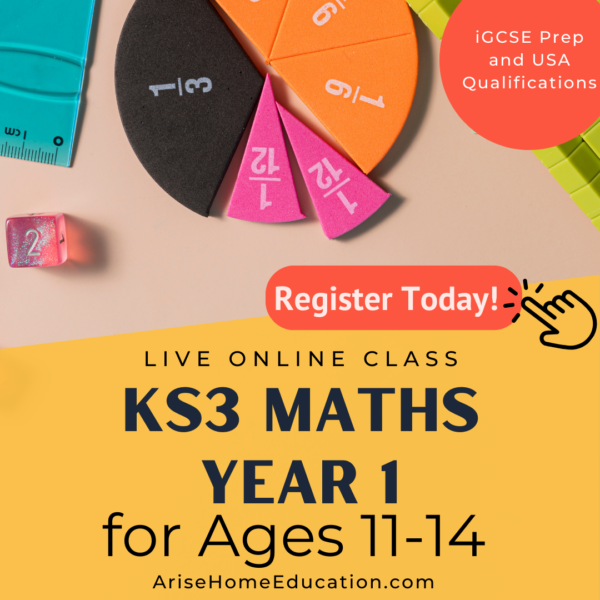
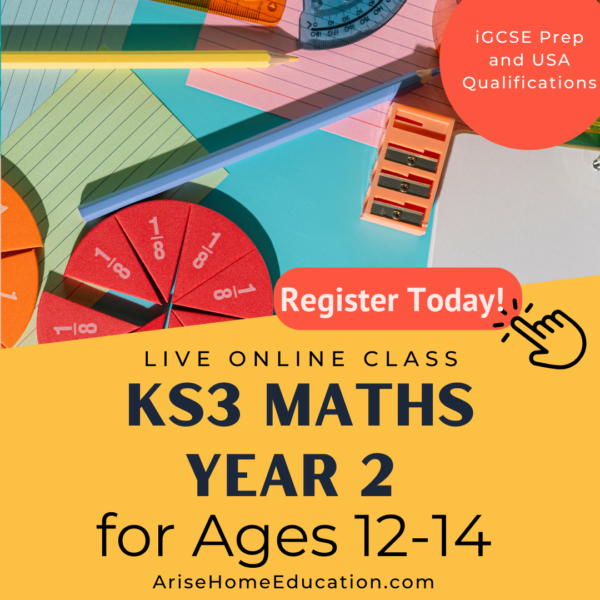


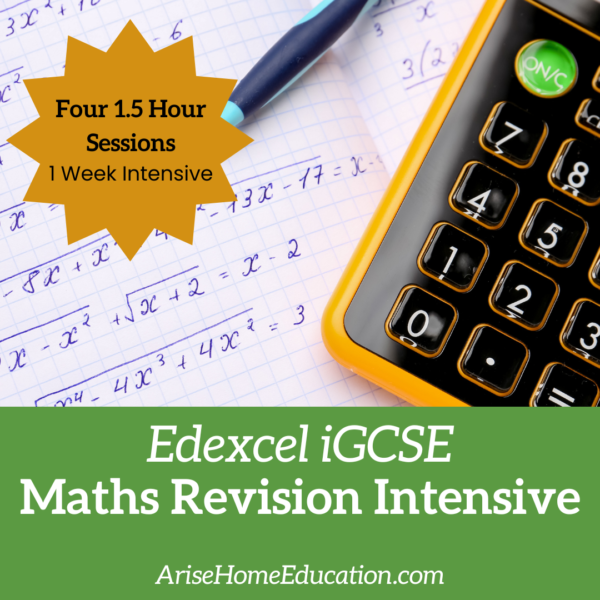


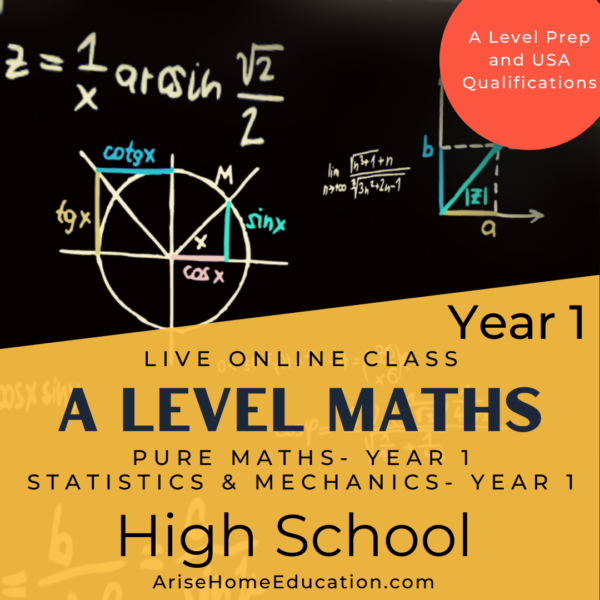
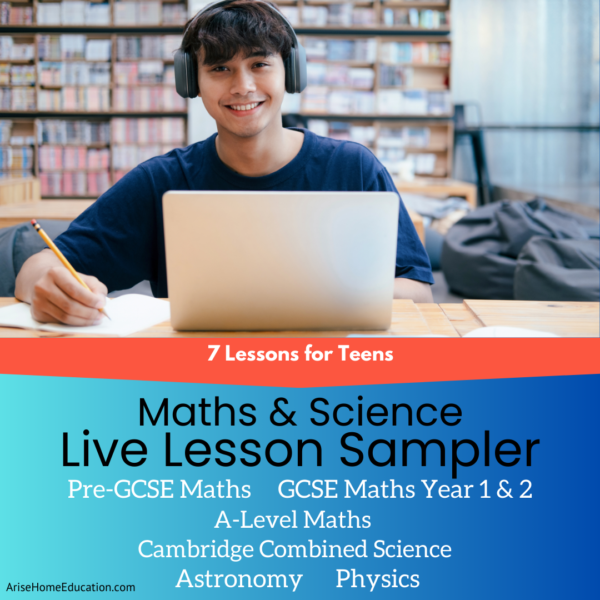
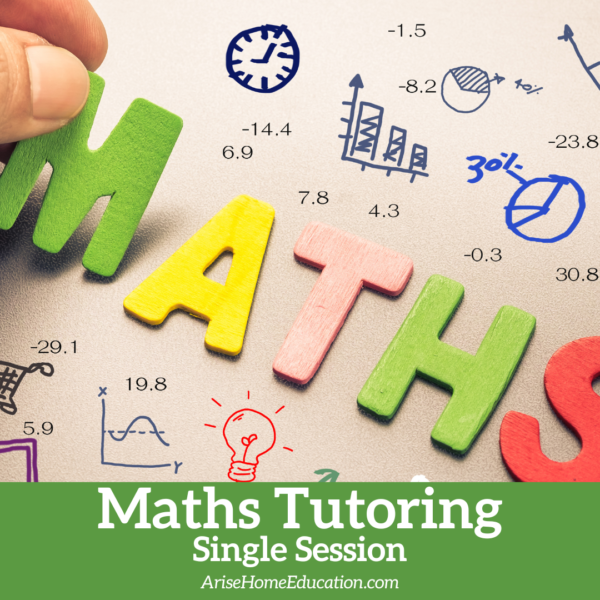



1 thought on “Math Readiness: GCSE Exam Prep for Homeschool Teens”
Comments are closed.